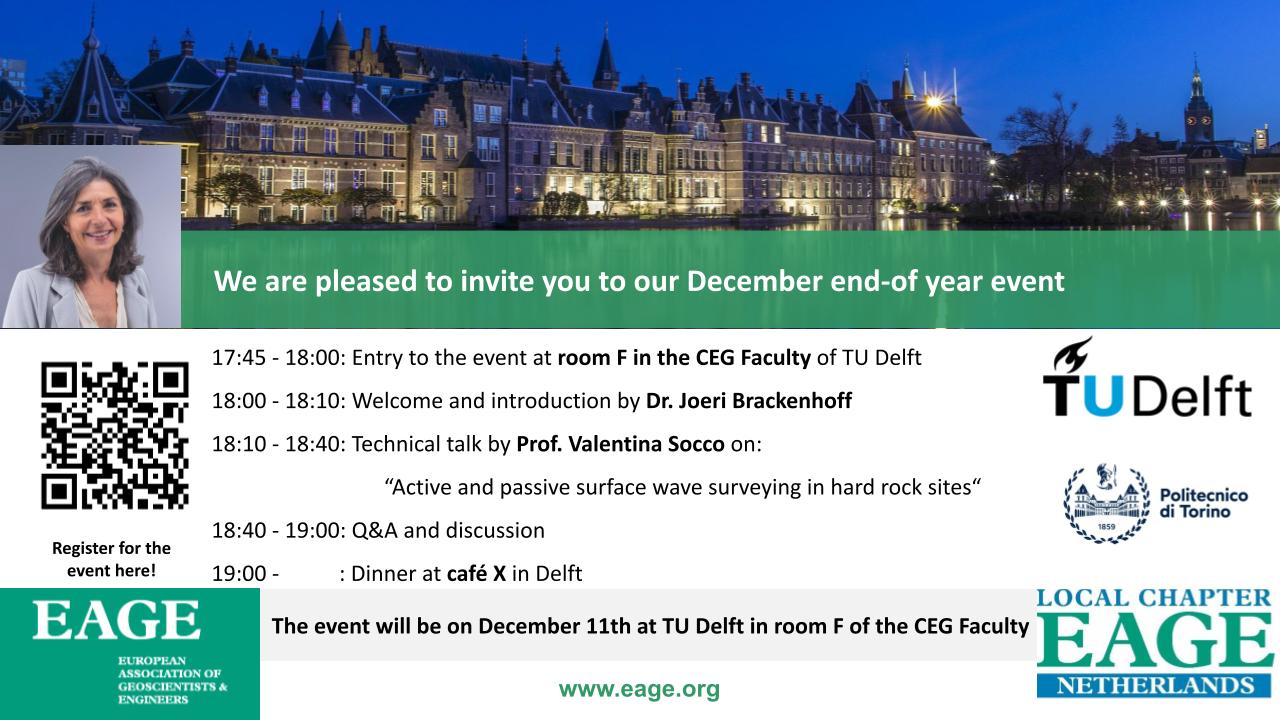Upcoming December event:
Active and passive surface wave surveying in hard rock sites
Information:
Our February event will be organized with sponsoring from EAGE
Date: December 11th, 17:45-22:00
Venue: TU Delft Room F, CEG Faculty, Stevinweg 1, 2628CN, Delft
Registration via Google forms
Agenda:
17:45 - 18:00 - Entry to the event at room F in the CEG Faculty of TU Delft
18:00 - 18:10 - Welcome and introduction by Dr. Joeri Brackenhoff
18:10 - 18:40 - Technical talk by Prof. Valentina Socco (TU Delft; Politecnico di Torino) on:
Active and passive surface wave surveying in hard rock sites
18:40 - 19:00 - Q&A and Discussion
19:00 - 20:00 - Dinner at café X in Delft
Abstract:
Surface waves data can be retrieved by any seismic records acquired for active and passive exploration purposes with whatever receiver layout and exploiting both active sources and ambient noise.
In hard rock sites, which are typical in mineral exploration, the data quality can be critical, but the high velocities of the formations generate long wavelengths that allow large investigation depth to be reached.
With appropriate processing and inversion workflows that include the application of interferometry and surface wave tomography 2D and 3D S- and P-wave velocity models can be estimated.
A series of case studies using active sources, traffic induced noise and ambient noise will be shown and methodological aspects related to optimal receiver layout and processing strategies will be discussed.
Speaker: Valentina Socco (TU Delft; Politecnico di Torino)
Biography:
Laura Valentina Socco, is presently Full Professor in Applied Geophysics at Tu Deflt and at Politecnico di Torino.
Prof. Socco works on developing geophysical techniques for near surface investigation in applications ranging from, seismic hazard and engineering, to hydrocarbon and mineral exploration, environment and cultural heritage.
In the last twenty years, she has focused her research work on surveying techniques based on the propagation of seismic surface waves for estimating subsurface velocity models and on geophysical data integration techniques.
In 2013 Prof Socco has been chosen as Honorary Lecturer by the SEG.
In 2014 she has received the Conrad Schlumberger Award (EAGE).
In 2019 Prof Socco has received the Outstanding Educator Award from SEG.
She has been Editor in Chief of Geophysics from 2017 to 2019.
She is presently EAGE President.
Prof. Socco is author of more than 150 scientific publications in peer reviewed journals and conferences.
She has been awarded with a honourable mention in the category best paper in Geophysics in 2012, 2013 and 2016.
She has been chair-person of the Near Surface Division Committee of EAGE and member of EAGE Board (2014-16).
She has been Associate Editor (2003-2013) Assistant Editor (2013-2017) of Geophysics and she has been Associate Editor (2006-2013) of Near Surface Geophysics.
